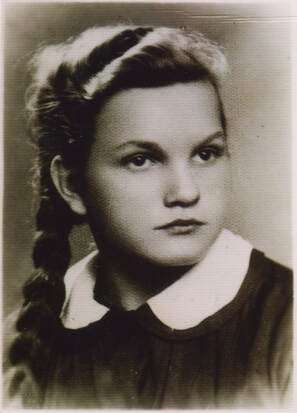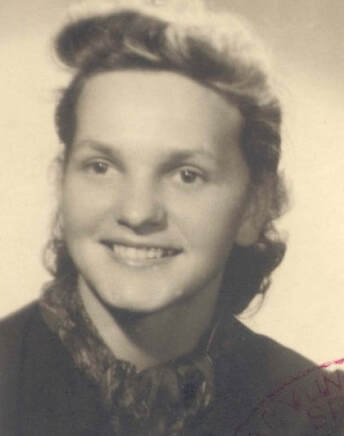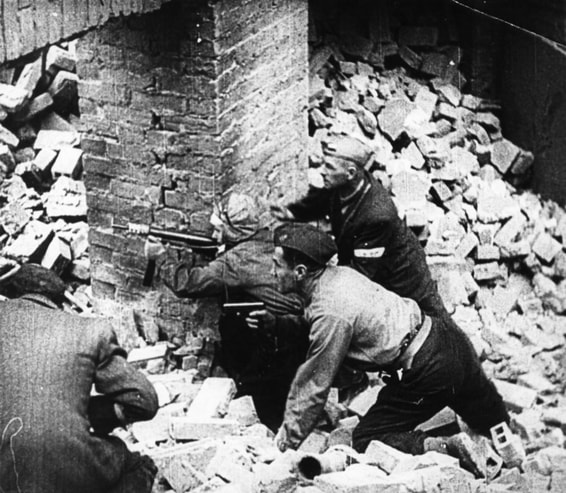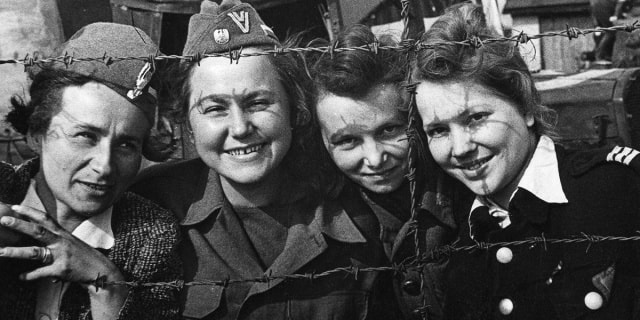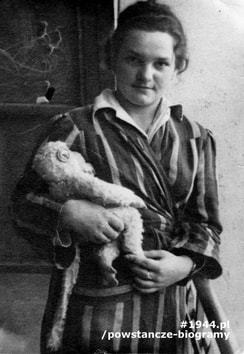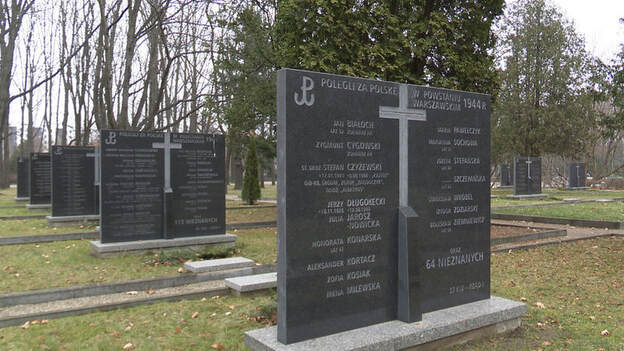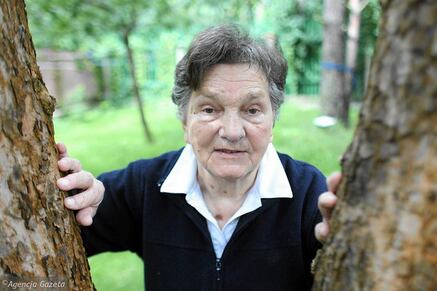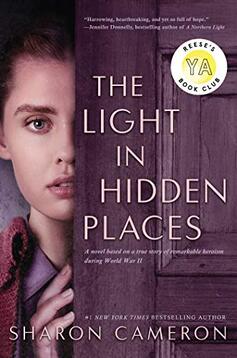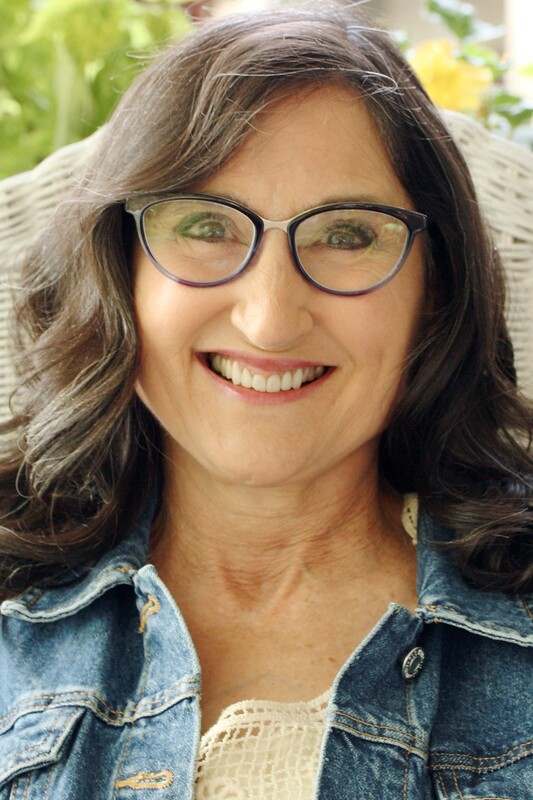|
Wanda Traczyk-Stawska was 12-years-old when the German army invaded Poland in 1939, and a bomb hit a house across the street from where she lived in Warsaw. "I ran out with this dog in my arms to see where this bomb hit, to possibly cry out for people's help," Wanda said. "I saw a woman running out of the rubble of a building with an infant...I saw the Germans shooting this woman, aiming at this infant. I saw this child fall apart." "And I was also at that time, first witnessing them throwing out of the house where we lived, my friend a Jew, I saw how they yanked her grandfather, how they pushed him, because he did not know what was going on, did not understand anything, cried, a terrible scene. Then my attitude towards the Germans was unequivocal." Not much later the Germans came and booted Wanda's family out of their apartment. She has spunk even at 12. "He pushed me, this officer, because I wasn't very polite," Wanda said. The Nazi officer also killed her beloved dog. Her mother, Wanda, an older brother and two younger sister had to move into her grandfather's one room. They had no running water or toilet. After her mother died in in January 1942, Wanda was left to care for her younger sisters. I first learned of the devastation Poland suffered at the guns of the Nazis when I adapted Irena's Children, for young readers. Nearly six million Poles were killed, close to a quarter of the country's population. "Poland suffered some of the worst horrors of World War II," according to CommonDreams.org. "From the start, the Nazis undertook a campaign of terror against what they deemed the racially inferior Poles. "At least two million non-Jewish Poles were publicly hung, shot, or killed en masse by gas; another roughly three million Jewish Poles, most of the country's Jews, were also killed, many at Auschwitz and other camps on Polish soil. The stated German goal, achieved to a chilling degree: "When we finish, nobody is left alive." This was the context for the Warsaw Uprising in August 1944, World War II's largest armed rebellion against German occupation. On the first day, Wanda, now 17, feared she would not get a chance to take part. "I was waiting for this uprising. I knew how to do what the boys could do, I could replace them. I imagined how their mothers would suffer after their deaths. I didn't have a mother - I thought I could be a good soldier because nothing would limit me. "I was ordered to brew coffee. I couldn't do it, but I was able to shoot well. I saw others fighting in the uprising, and I thought I wouldn't do anything - it was supposed to last only three days." A superior recognized Wanda's potential and she became a messenger delivering death notices to Poles collaborating with the Nazis. Dangerous as this was, she was not armed. Finally, a boy gave him her his pistol, and she was also allowed to throw grenades. As the battle progressed in different areas of Warsaw, Wanda was finally given a submachine gun. "We were very young," Wanda said. "These friendships that formed in the Uprising are mutual understanding, resulting from the fact that we were very young, we were teenagers. This is a time when ideals are more important than life. "Maybe it was the naivety...but we thought that we could cope, that insurgent troops would throw the Germans out of Warsaw. We knew that some of us would die, but we decided that we would fight." The Polish Home Army fought for two months before the Germans crushed their resistance. Wanda was wounded, captured and sent to several prison camps where conditions nearly killed her. "And they didn't give us food, we didn't have any dressings, and yet they were women. Besides, the worst part was that earlier in the winter it was so cold in the barracks, that there was frost on the hair, there was no mattress, not even straw there was, we slept on the boards. We didn't have blankets yet. There were very difficult conditions. Sometimes they gave us such food, after which the whole camp was sick. This food was such bugs floating in the soup." Below: More than 1,700 of the 5,000 women who fought in the uprising were sent to the Oberlangen camp, liberated April 12, 1945 Below: Wanda Traczyk-Stawska and her plush childhood toy, the only one that survived the war. Interfores, April 2014 (Photo: Ap) Albert Zawada / Agencja Gazeta) After liberation, Wanda was sent to Palestine, to the School of Junior Volunteers in Nazareth, where she finished high school. She missed Poland and returned in 1947, where she earned a degree in Psychology and Pedagogy at the University of Warsaw. Wanda married, had two children and worked for 30 years at a school for disabled children. She also carried out another important mission. General Antoni Chruściel ps. "Monter", one of the main commanders of the Warsaw Uprising asked Wanda to help locate the remains of the soldiers who died in the uprising, and to make sure they were buried where they could be remembered and honored for their sacrifice . Some10,000 Polish resistance fighters and 200,000 civilians were killed during the 63 days of the Warsaw Uprising. Thousands were buried in makeshift graves all over Warsaw and thousands more were never identified or given any sort of burial. The huge task of exhuming and re-burying the dead began in 1945. After World War II when Poland fell under Soviet rule, Polish resistance fighters were considered to be dissidents, not heroes. Not until decades later have they been recognized as patriots struggling for the independence of Poland. Wanda worked faithfully for many years until all as many names as possible were put on record in the Warsaw Insurgent Cemetery. Her brother, two years older than she, died in the uprising and she was not able to discover where he'd been buried for 28 years. On the 76th anniversary of the uprising's outbreak, Wanda Traczyk-Stawska was recognized as an uprising insurgent and for her work as the leader of the Social Committee for the Warsaw Uprising Cemetery. In her 90s, Wanda is once against standing up for human rights in Poland, in particular, the rights of gay people. She has spoken out against comments made by Olympic medal winner, Sofia Klepacka. The bronze medalist for wind surfing announced her desire for a "traditional Poland" and equated homosexuals to pedephiles. “Anyone aware of what that dignity means, must remember that its foundation is freedom,” responded Wanda Traczyk-Stawska. “That nobody can be mistreated because of their different skin colour, different views or sexual orientation." Wanda celebrated her 94th birthday, April 7, 2021. Sources https://warszawa.wyborcza.pl/warszawa/1,34862,17246096,wanda-traczyk-stawska-paczek-z-blyskawica.html? https://histmag.org/dziewczyna-z-blyskawica-11982 https://www.1944.pl/powstancze-biogramy/wanda-traczyk,46254.html https://www.commondreams.org/further/2019/09/03/village-idiot-offers-congrats-poland-nazi-invasion-decimated-their-country-and Coincidentally, this week I listened to an audio book set in Poland during World War II. It's historical fiction based very closely on the events of a true story. I highly recommend it. The Light in Hidden Places by Sharon Cameron is about Polish teenager Stefania Podgorska who hid thirteen Jews in her attic during World War II. Her bravery, smarts and sacrifice will utterly amaze you. It's another story demonstrating a young woman with the will to do the right thing no matter the consequences.
Comments are closed.
|
I'm fascinated to discover little-known history, stories of people and events that provide a new perspective on why and how things happened, new voices that haven't been heard, insight into how the past brought us here today, and how it might guide us to a better future.
I also post here about my books and feature other authors and their books on compelling and important historical topics. Occasionally, I share what makes me happy, pictures of my garden, recipes I've made, events I've attended, people I've met. I'm always happy to hear from readers in the blog comments, by email or social media. Archives
September 2023
Categories
All
|
